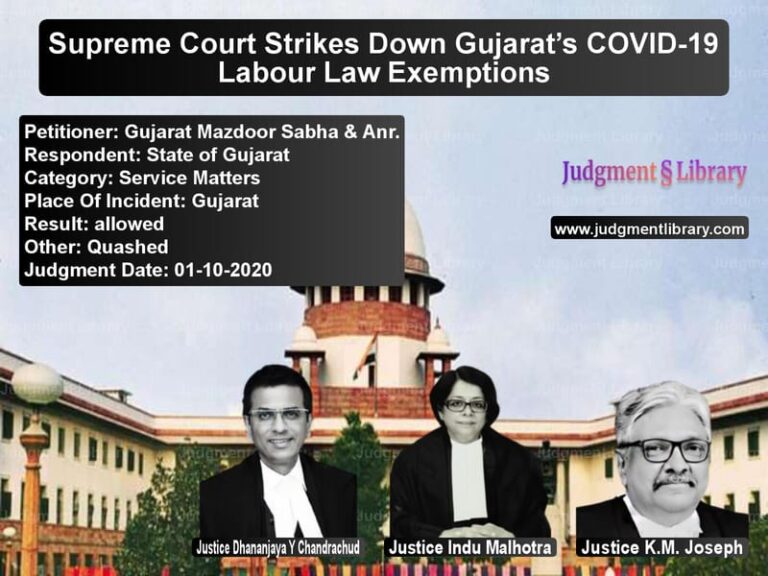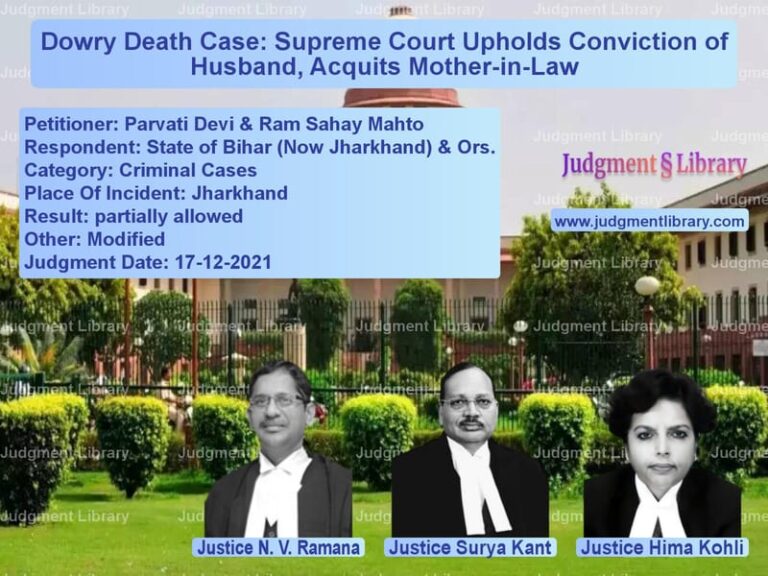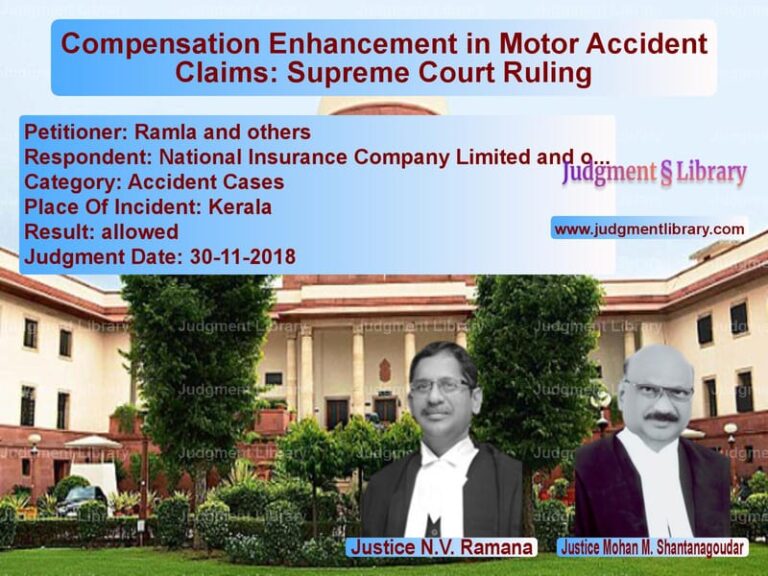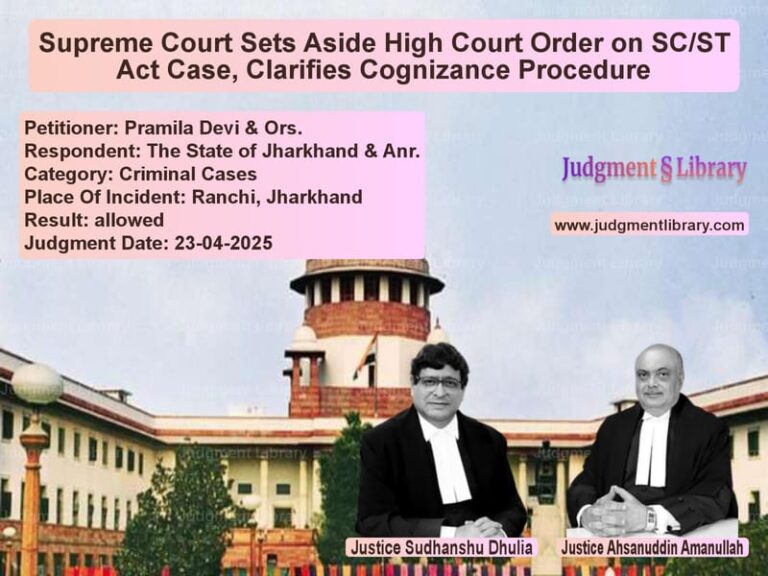Supreme Court Reinstates Cheque Bounce Case Against Rajwant Singh & Others
The Supreme Court of India has reinstated criminal complaints under Section 138 of the Negotiable Instruments Act, 1881 (NI Act), against Rajwant Singh & Others after the complaints were dismissed by the trial court due to non-appearance of the complainant, BLS Infrastructure Limited. The case, BLS Infrastructure Limited v. Rajwant Singh & Others, highlights the legal obligations of courts when dealing with cheque bounce cases and the proper application of Section 256 of the Code of Criminal Procedure (CrPC).
Background of the Case
BLS Infrastructure Limited had filed eight complaints under Section 138 of the NI Act against Rajwant Singh and others. These complaints, filed between 2011 and 2017, were based on dishonored cheques issued by the respondents. The Metropolitan Magistrate at Saket Courts, New Delhi, dismissed these complaints on January 25, 2019, citing non-appearance of the complainant.
The complainant, however, argued that their legal counsel had misled them into believing that a settlement was being negotiated, which led to their absence in court. They filed criminal leave petitions before the Delhi High Court, which were dismissed on November 7, 2019. Consequently, they approached the Supreme Court.
Petitioner’s Arguments (BLS Infrastructure Limited)
The complainant, represented by Senior Advocate Maninder Singh, argued:
- The Magistrate erred in dismissing the complaints without considering the proviso to Section 256(1) of the CrPC, which allows cases to proceed in the absence of the complainant if legal representation is present.
- The trial had already reached an advanced stage, with the complainant’s evidence recorded and cross-examination completed.
- As per the Supreme Court’s precedents in Associated Cement Co. Ltd. v. Keshvanand and S. Anand v. Vasumathi Chandrasekar, courts must decide cases on merit rather than dismissing them purely on technical grounds.
- Since the complainant had already been cross-examined and evidence was on record, the Magistrate should have proceeded with the trial instead of acquitting the accused.
Respondent’s Arguments (Rajwant Singh & Others)
The accused, represented by their counsel, countered:
- Section 256(1) of the CrPC mandates that if a complainant does not appear on the scheduled date, the Magistrate must acquit the accused.
- The complainant failed to demonstrate any valid reason for their repeated absence.
- Any alleged misguidance by legal counsel does not justify reinstating dismissed complaints.
- The Magistrate’s decision was in accordance with the law and should not be overturned.
Supreme Court’s Judgment
The Supreme Court bench, comprising Justices Sudhanshu Dhulia and Manoj Misra, ruled in favor of BLS Infrastructure Limited, setting aside the dismissal orders.
“Where the prosecution has closed its case and the complainant has been examined, the court was required to pass a judgment on the merits of the matter.”
The Court provided the following reasons for reinstating the cases:
- The Magistrate failed to consider the proviso to Section 256(1) CrPC, which allows a trial to continue even if the complainant is absent, provided evidence has been recorded.
- The trial had already progressed significantly, and dismissal was not the appropriate course of action.
- The High Court also erred in not considering the importance of deciding cases based on merits rather than procedural lapses.
The Court directed that the cases be restored to their original position before dismissal and that the trial proceed from that stage.
Key Takeaways from the Judgment
For Cheque Bounce Cases:
- The judgment reinforces the need to decide cases on merits rather than dismissing them due to procedural technicalities.
- Courts should ensure complainants have fair opportunities to present their case, especially in economic offenses.
For Judicial Oversight:
- Magistrates must apply Section 256 of the CrPC carefully, especially when evidence has already been recorded.
- The Supreme Court has reiterated that cases should not be dismissed purely due to non-appearance if a trial has substantially progressed.
For Legal Practitioners:
- Complainants must ensure regular follow-up with their legal representatives to avoid procedural dismissals.
- Defense lawyers must be aware that acquittals under Section 256 may not always be final if substantial evidence exists.
Conclusion
The Supreme Court’s ruling in BLS Infrastructure Limited v. Rajwant Singh & Others reinforces the principle that criminal cases, especially those under the Negotiable Instruments Act, should not be dismissed due to mere technical lapses. The judgment clarifies the correct application of Section 256 CrPC and ensures that economic offenses are decided based on substantive justice rather than procedural errors.
With the reinstatement of these cases, the trial court will now have to examine the matter on merits, ensuring justice for both parties involved.
Petitioner Name: BLS Infrastructure Limited.Respondent Name: Rajwant Singh & Others.Judgment By: Justice Sudhanshu Dhulia, Justice Manoj Misra.Place Of Incident: New Delhi.Judgment Date: 28-02-2023.
Don’t miss out on the full details! Download the complete judgment in PDF format below and gain valuable insights instantly!
Download Judgment: bls-infrastructure-l-vs-rajwant-singh-&-othe-supreme-court-of-india-judgment-dated-28-02-2023.pdf
Directly Download Judgment: Directly download this Judgment
See all petitions in Cheque Dishonour Cases
See all petitions in Contract Disputes
See all petitions in Judgment by Sudhanshu Dhulia
See all petitions in Judgment by Manoj Misra
See all petitions in allowed
See all petitions in Remanded
See all petitions in supreme court of India judgments February 2023
See all petitions in 2023 judgments
See all posts in Civil Cases Category
See all allowed petitions in Civil Cases Category
See all Dismissed petitions in Civil Cases Category
See all partially allowed petitions in Civil Cases Category







